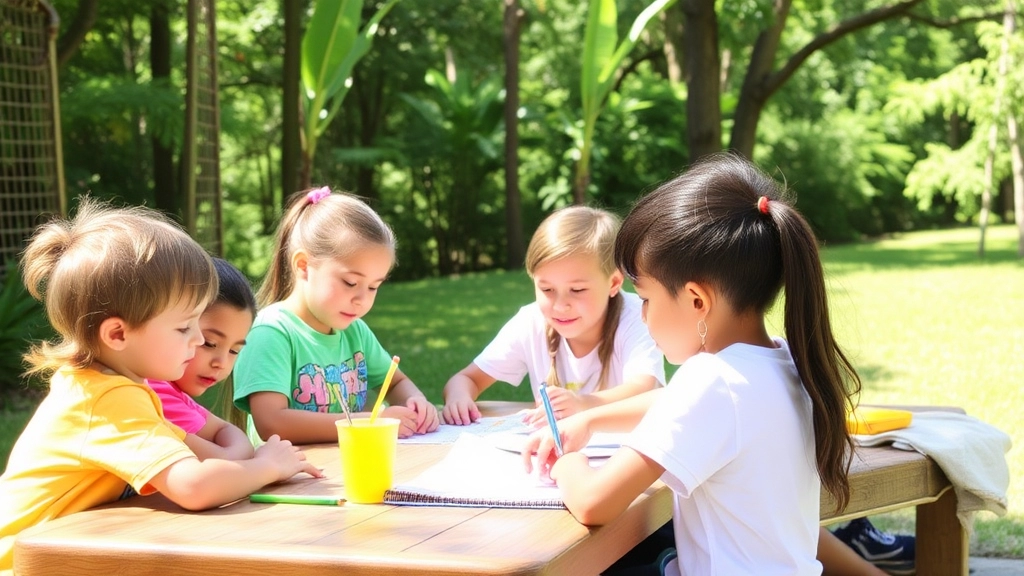Looking for the Perfect Summer Camp?
Looking for the perfect summer camp for elementary students? You’re in the right place! Whether your child is into science, technology, engineering, or arts, there’s a camp out there that can make their summer unforgettable. From hands-on STEM activities to creative arts and crafts, summer camps offer a variety of experiences that cater to every interest and help kids learn while having fun.
Choosing the Right Camp
Choosing the right camp is crucial. Think about your child’s interests and what they enjoy most. Are they curious about how things work? A STEM camp might be perfect. Do they love painting or acting? Look for camps that focus on creative arts. The benefits of these camps go beyond just keeping kids busy; they enhance social skills, problem-solving abilities, and overall curiosity.
Ready to Find the Ideal Summer Camp?
Ready to find the ideal summer camp for your elementary student? Let’s dive in!
Types of Summer Camps for Elementary Students
Alright, let’s dive right into it. When it comes to summer camps for elementary students, there’s a ton of variety out there. And as a parent, I know you’re probably wondering, “Which one is right for my kid?” Let’s break it down.
Traditional Day Camps
These are your classic camps. Think of activities like swimming, arts and crafts, sports, and nature hikes. They’re perfect if you want your child to get a bit of everything. Plus, they come home every night, so you get the best of both worlds.
STEM Camps
STEM (Science, Technology, Engineering, and Mathematics) camps are booming right now. Kids get to dive into robotics, coding, and even space exploration. If your child is always tinkering with gadgets or asking how things work, this might be the way to go.
Creative Arts Camps
Got a little Picasso or Shakespeare at home? Creative arts camps focus on painting, drawing, music, drama, and dance. It’s a fantastic way for kids to express themselves and build confidence.
Sports Camps
For the energetic ones who can’t sit still, sports camps are a lifesaver. From football to gymnastics, these camps focus on skill-building, teamwork, and staying active. Perfect for burning off that endless energy.
Adventure Camps
These are for the little adventurers. Activities include rock climbing, kayaking, and wilderness survival skills. It’s all about pushing boundaries and building resilience.
Special Interest Camps
These camps focus on niche interests. Think chess, cooking, or even magic. If your child has a specific passion, there’s probably a camp for it.
Academic Enrichment Camps
These camps are for the brainiacs. They offer advanced courses in subjects like maths, science, and literature. Great for keeping those academic skills sharp over the summer.
Faith-Based Camps
For families looking to incorporate religious teachings and values into their summer activities, faith-based camps provide a blend of traditional camp fun with spiritual growth.
Example Time
Let me share a quick story. My friend’s daughter, Mia, was always fascinated by stars and planets. They enrolled her in a space-themed STEM camp. By the end of the summer, she was naming constellations and talking about black holes like a mini-astronomer. That’s the power of finding the right camp.
Quick Tips for Choosing the Right Camp
- Know your child’s interests: Are they more into sports or science?
- Check the camp’s reputation: Read reviews, ask other parents.
- Consider the camp’s location: Is it convenient for drop-offs and pick-ups?
- Look at the schedule: Does it fit with your summer plans?
- Budget: Make sure it aligns with what you’re willing to spend.
If you’re looking for more detailed guidance on selecting the perfect camp, check out our Ultimate Guide to Choosing a Cheer Summer Camp. And for those interested in specific activities, our Fun Activities at Summer Camp article is a must-read!
Popular STEM Camps for Young Learners
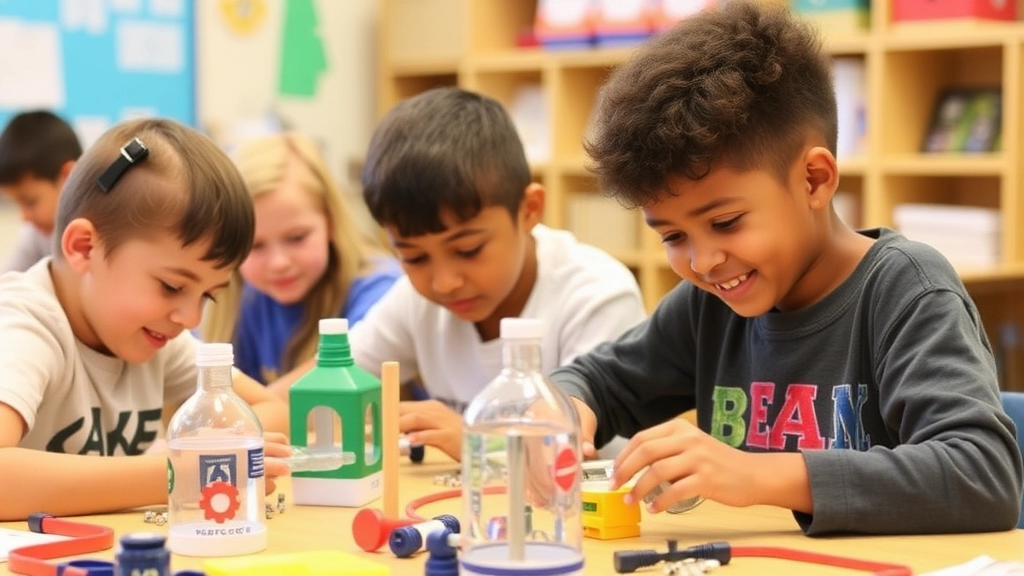
Ever wondered if a summer camp could spark your child’s interest in science and tech?
Let’s dive into the world of STEM camps for young learners.
What Makes STEM Camps So Popular?
STEM stands for Science, Technology, Engineering, and Maths.
These camps are all about making these subjects fun and engaging.
Real Benefits of STEM Camps
Kids aren’t just sitting in a classroom.
They’re building robots, coding games, and even launching mini rockets.
Hands-On Learning
Remember the joy of building something with your own hands?
That’s what these camps offer.
- Robotics: Imagine your kid building a robot from scratch.
- Coding: They can create their own video games.
- Science Experiments: Think volcano eruptions and slime making.
Real Stories
I remember a friend telling me how her son, who hated maths, fell in love with it after a coding camp.
He was solving problems without even realising it.
Why Are They So Engaging?
These camps use real-world applications to teach.
No more boring lectures.
Just fun, interactive sessions.
Popular STEM Camps to Consider
- Camp Invention: Focuses on creativity and innovation.
- iD Tech Camps: Offers coding, AI, and game design.
- Mad Science Camps: Perfect for young scientists.
How to Choose the Right STEM Camp?
Think about your child’s interests.
Do they love building things?
Or are they more into computers?
What to Look For?
- Reputation: Check reviews and testimonials.
- Curriculum: Ensure it aligns with your child’s interests.
- Instructors: Experienced and engaging teachers.
Hands-On Learning Experiences at Camps
Ever wondered if your child is actually learning anything useful at summer camp? Or if they’re just running around aimlessly? Well, let me break it down for you. Hands-on learning experiences at camps are where the magic happens. These camps are designed to make learning fun and engaging, so your child doesn’t even realise they’re learning.
Why Hands-On Learning Rocks
First off, hands-on learning is all about doing. Kids don’t just sit there and listen; they get involved. This approach is super effective because it keeps them engaged and makes the lessons stick. Think about it: what do you remember more, reading about how to build a rocket or actually building one? Exactly.
Real-Life Examples and Stories
Let me give you a real-life example. My friend’s daughter, Emily, attended a STEM camp last summer. She’s always been curious about how things work, but school wasn’t cutting it for her. At camp, she built a robot from scratch. Yep, a robot! She learned about circuits, coding, and problem-solving, all while having a blast. By the end of the camp, she was so proud of what she’d accomplished, and her interest in STEM skyrocketed.
Key Activities in Hands-On Camps
So, what exactly do kids do at these camps? Here’s a quick rundown:
- Building Projects: From robots to birdhouses, kids get to create something tangible.
- Science Experiments: Think volcano eruptions, slime making, and chemical reactions.
- Coding and Programming: Kids learn the basics of coding through fun games and activities.
- Outdoor Exploration: Nature walks, scavenger hunts, and environmental science projects.
These activities aren’t just for fun; they’re designed to teach critical thinking, teamwork, and problem-solving skills.
Benefits of Hands-On Learning
Here’s why hands-on learning at camps is a game-changer:
- Boosts Retention: Kids remember what they do more than what they hear.
- Encourages Curiosity: Hands-on activities spark curiosity and a love for learning.
- Builds Confidence: Completing projects gives kids a sense of accomplishment.
- Promotes Teamwork: Many activities require kids to work together, enhancing social skills.
How to Choose the Right Hands-On Camp
Choosing the right camp can be overwhelming, but here are some tips:
- Identify Interests: What does your child love? Science, art, sports?
- Check Reviews: Look for camps with positive feedback from other parents.
- Visit the Camp: If possible, visit the camp to see the facilities and meet the staff.
- Ask Questions: Don’t hesitate to ask about the activities, safety measures, and staff qualifications.
For more guidance, you might want to check out our Summer Camp Registration Form Template Guide to ensure you have all the necessary information. If your child is particularly interested in science, our Ultimate Guide to Scout Summer Camp can provide additional insights into specialized camps that focus on hands-on learning.
Choosing the Right Camp Based on Your Child’s Interests
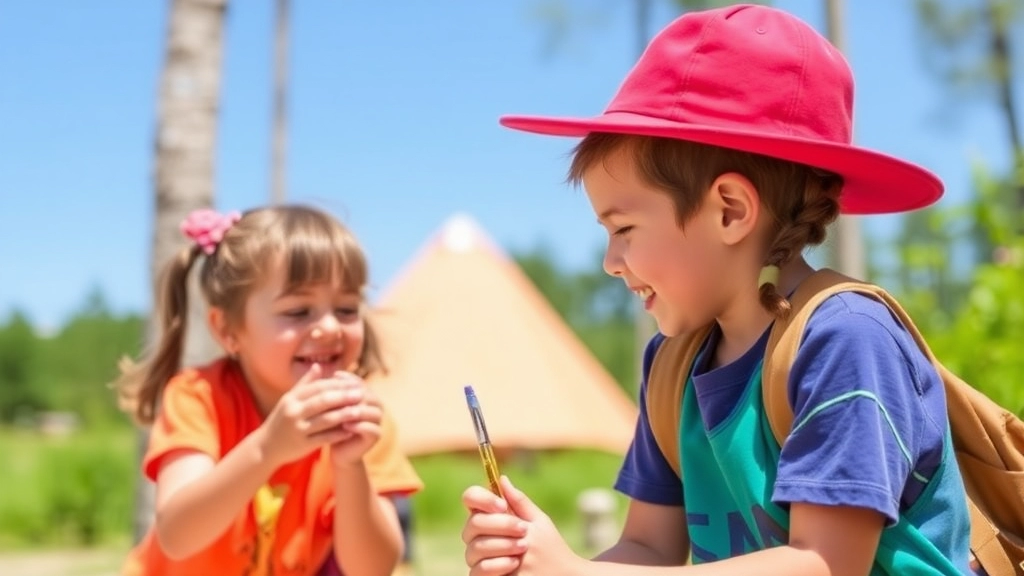
Worried about picking the perfect summer camp for your child?
You’re not alone.
Finding a camp that matches your child’s interests can feel like a treasure hunt.
But guess what?
It’s totally doable.
Here’s how you can nail it.
Know Your Child’s Interests
First off, get to know what your child loves.
- STEM Enthusiast: Into science, tech, engineering, or maths? Look for a STEM camp.
- Creative Soul: Loves painting, acting, or writing? Creative camps are the way to go.
- Outdoor Adventurer: Can’t get enough of nature? Outdoor camps are perfect.
Match Camp Activities with Interests
Next, dive into the camp’s activities.
- STEM Camps: Robotics, coding, and science experiments.
- Creative Camps: Art projects, drama performances, and creative writing.
- Outdoor Camps: Hiking, camping, and survival skills.
Consider Camp Type
Think about the camp type that suits your child:
- Day Camps: Great for first-timers. They get to come home every day.
- Overnight Camps: Perfect for building independence.
- Specialised Camps: Focus on one area, like a robotics camp or a theatre camp.
Ask for Recommendations
Talk to other parents.
- Parent Groups: Join local parent groups or online forums.
- School Counsellors: They often have great insights.
Visit the Camp
If possible, visit the camp.
- Meet the Staff: See if they’re friendly and experienced.
- Check the Facilities: Make sure they’re safe and well-maintained.
Read Reviews
Search online for reviews.
- Parent Testimonials: Real feedback from other parents.
- Camp Ratings: Check ratings on camp directories.
Budget Considerations
Keep your budget in mind.
- Early Bird Discounts: Sign up early for discounts.
- Scholarships: Some camps offer financial aid.
Benefits of STEM and Creative Camps
Ever wondered why sending your kid to a STEM or creative camp is worth it? Let’s break it down.
Why STEM and Creative Camps Matter
Right off the bat, these camps are game-changers. They don’t just fill up summer days; they build skills that stick. Think about itâwhen your kid dives into coding or paints their first masterpiece, they’re not just having fun. They’re setting up a foundation for future success.
Real Skills for Real Life
STEM Camps:
- Critical Thinking: Kids learn to solve problems like a boss. Whether it’s building a robot or cracking a code, they get into the habit of thinking critically.
- Teamwork: Working on projects together teaches them how to collaborate. Trust me, this skill is gold.
- Adaptability: Tech changes fast. Kids who get comfy with new tools and concepts are ahead of the curve.
Creative Camps:
- Imagination: Whether it’s drama, painting, or creative writing, these camps let kids’ imaginations run wild.
- Self-Expression: They learn to express themselves, which is huge for confidence.
- Resilience: Not every project turns out perfect, and that’s okay. Learning to bounce back from mistakes is a life skill.
Boosting Social Skills
Let’s be realâkids need to learn how to get along with others. Camps are perfect for this. They meet new friends, learn to share, and even handle conflicts. It’s like a crash course in social skills.
Stories from the Field
I remember this one kid, Jake. He was super shy, barely spoke a word. His parents signed him up for a robotics camp. By the end of the summer, he was leading his team and presenting their project to a room full of parents. That’s the kind of transformation we’re talking about.
Curiosity and Exploration
These camps spark curiosity. Kids start asking questions, exploring new ideas, and getting excited about learning. It’s not just about the subject matter; it’s about fostering a lifelong love for discovery.
Choosing the Right Camp
You might be thinking, “How do I pick the right camp?” Simple. Match the camp to your child’s interests. If they’re into tech, go for a coding camp. Love arts and crafts? Find a creative arts camp. The right camp can make all the difference.
How Camps Enhance Social and Problem-Solving Skills
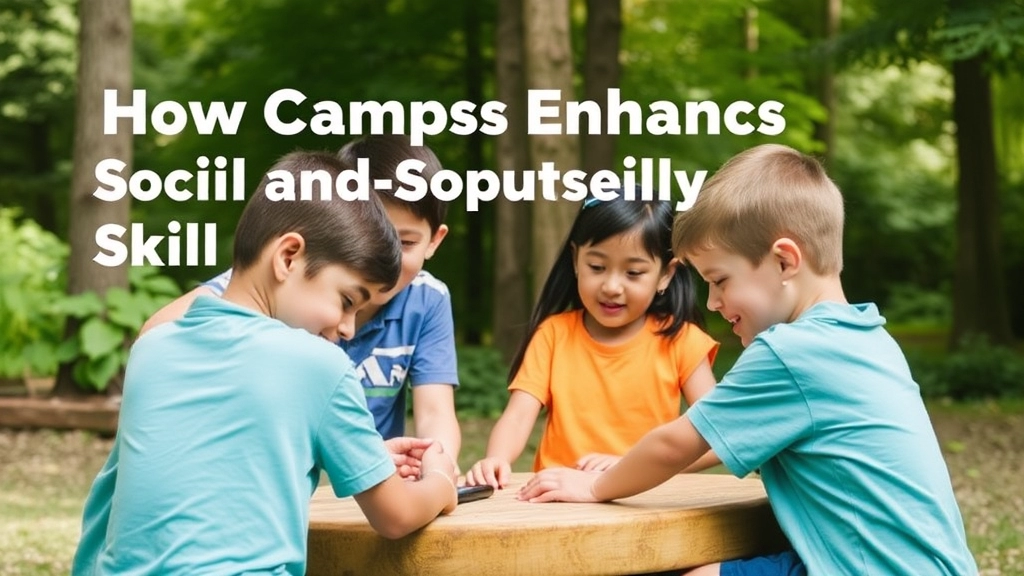
Ever wondered how summer camps can boost your child’s social and problem-solving skills?
It’s a big worry for many parents.
We all want our kids to thrive, make friends, and handle challenges head-on.
So, let’s dive in.
Building Social Skills
At camp, kids meet a bunch of new faces.
- Team Activities: From sports to group projects, they learn to work together.
- New Friendships: They bond over shared interests, creating lasting connections.
- Conflict Resolution: Disagreements happen, and they learn to resolve them without adult intervention.
Think about your child coming home with stories of new friends and exciting adventures.
Enhancing Problem-Solving Skills
Camps are a playground for the brain.
- Challenges and Puzzles: Whether it’s a STEM camp or a creative one, kids face tasks that make them think.
- Hands-On Projects: Building, coding, or crafting – they learn by doing, which is the best way to grasp complex concepts.
- Real-Life Scenarios: Camps often simulate real-world problems. Kids brainstorm, plan, and execute solutions.
Remember that time you solved a tricky problem at work? Imagine your child getting that same satisfaction.
Real Stories, Real Impact
Take Jack, a shy 8-year-old who attended a STEM camp last summer.
He struggled with teamwork initially.
But by the end of the camp, he was leading his group in a robotics challenge.
His confidence soared, and his teacher noticed a big improvement in class participation.
Why It Matters
- Confidence Boost: Kids return home feeling accomplished.
- Life Skills: They learn skills that textbooks can’t teach.
- Future Ready: Problem-solving and social skills are crucial for future success.
So, next time you’re considering a summer camp, think beyond the fun activities.
Think about the growth, the skills, and the confidence your child will gain.
And trust me, it’s worth every penny.
Ready to See Your Child Thrive?
Don’t miss out on these opportunities.
Find the perfect camp that will enhance your child’s social and problem-solving skills.
Camp Activities That Promote Curiosity and Exploration
Ever wondered how to keep your kid’s mind buzzing with excitement over the summer? Camp activities that promote curiosity and exploration are your secret weapon. Trust me, these aren’t just any activitiesâthey’re designed to spark wonder and a thirst for knowledge in young minds.
Why Should You Care?
You’re probably asking, “Why should I even care about these activities?” Well, let me break it down for you:
- Keeps kids engaged: No more “I’m bored” complaints.
- Boosts learning: They learn without even realising it.
- Fosters independence: They become little explorers, figuring things out on their own.
Hands-On Experiments and Science Projects
One of the best ways to get kids curious is through hands-on experiments. Think about itâkids love getting their hands dirty, and when they do, they learn better. Some camps offer:
- DIY volcanoes: A classic, but always a hit.
- Slime making: Who knew chemistry could be this fun?
- Rocket building: They build it, launch it, and learn the science behind it.
These activities not only teach scientific principles but also get kids asking “why” and “how.”
Nature Walks and Outdoor Exploration
Getting kids outside is crucial. Nature walks and outdoor exploration are perfect for promoting curiosity. Camps often have:
- Bug hunts: Equip them with magnifying glasses and let them discover the tiny world.
- Tree identification: A little botany never hurt anyone.
- Star gazing: Introduce them to astronomy. Who knows, you might have a future astronaut on your hands.
These activities help kids appreciate the world around them and develop a sense of wonder.
Creative Arts and Crafts
Don’t underestimate the power of arts and crafts. These activities can be incredibly stimulating and promote exploration in a different way. Camps often include:
- Pottery: Let them shape and mould their imagination.
- Painting: Not just any painting, but themed ones like “paint your favourite animal.”
- Recycled art: Teach them about sustainability while they create.
Team-Based Challenges
Ever heard of escape rooms for kids? Camps are getting creative with team-based challenges that promote problem-solving and exploration. Some popular ones include:
- Treasure hunts: With clues that make them think.
- Obstacle courses: Physical and mental challenges combined.
- Puzzle games: Where teamwork and brains come together.
These activities teach kids the value of teamwork and critical thinking.
Real-Life Stories
Let me share a quick story. Last summer, my niece attended a camp that had a “mini-scientist” day. She came back home buzzing with excitement about the simple chemical reactions she saw. She even tried to recreate them in the kitchen! That’s the kind of curiosity and exploration we’re talking about.
Tips for Parents on Preparing Kids for Camp
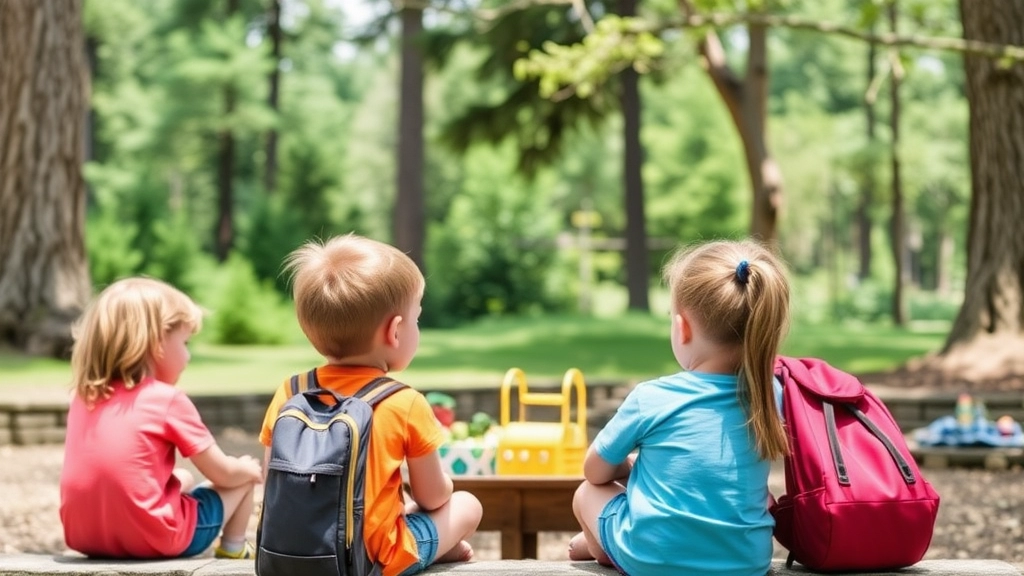
Worried about sending your child to camp for the first time?
I get it. It’s a big step.
Here’s how you can make sure your child is ready and excited for their summer adventure.
Talk About It
- Start a Conversation: Sit down with your child and chat about what camp will be like. Share stories if you have any.
- Address Fears: Ask them what they’re nervous about. Reassure them with facts and positive experiences.
Visit the Camp
- Take a Tour: If possible, visit the camp beforehand. Let your child see where they’ll sleep, eat, and play.
- Meet the Staff: Introduce your child to some of the camp leaders. Familiar faces can ease anxiety.
Pack Together
- Create a Checklist: Make a packing list together. This way, they know what they’re bringing and where to find it.
- Label Everything: Use labels for clothes and gear. It prevents mix-ups and lost items.
Practice Independence
- Self-Care Skills: Teach them to manage personal hygiene, dress themselves, and keep track of their belongings.
- Decision-Making: Let them make small decisions at home. It builds confidence for camp choices.
Stay Positive
- Excitement Over Fear: Focus on the fun activities they’ll do and the friends they’ll make.
- Share Success Stories: Talk about other kids who loved camp and grew from the experience.
Keep Communication Open
- Set Expectations: Explain how and when you’ll communicate during camp. Letters, emails, or calls – whatever the camp allows.
- Encourage Sharing: Let them know it’s okay to talk about their feelings and experiences.
Health and Safety
- Medical Forms: Ensure all health forms are completed and any medications are packed with clear instructions.
- Safety Talks: Discuss basic safety rules and what to do in case of an emergency.
Plan for Homesickness
- Comfort Items: Pack a favourite stuffed animal or family photo.
- Stay Busy: Encourage participation in activities to keep their mind off missing home.
Locations and Accessibility of Summer Camps
Are you worried about finding the right summer camp for your child? Let’s dive into some real talk about locations and accessibility. We all know that choosing the perfect camp can be a logistical nightmare, but it doesn’t have to be. Whether you’re in the city or out in the countryside, there’s a camp that fits your needs.
Finding Camps Near You
First things first, location is key. You don’t want to spend hours driving to a camp every day. Here’s how you can find camps close to home:
- Local Community Centres: Many community centres offer summer camps. They’re often close by and can be a convenient option.
- Schools and Universities: Check if local schools or universities host summer programs. They usually have great facilities and experienced staff.
- Online Searches: Use search engines to find camps in your area. Websites like Google Maps can show you camps near your location.
Accessibility Matters
Accessibility isn’t just about distance. It’s also about ensuring the camp is suitable for your child’s needs. Here are some things to consider:
- Special Needs: If your child has special needs, look for camps that offer tailored programs. Many camps are inclusive and have trained staff to support all children.
- Transportation Options: Some camps offer bus services or carpool options. This can make your life a lot easier. For more details, check out our Summer Camp with Transportation: A Parent’s Guide.
- Facilities: Ensure the camp has the necessary facilities like ramps, accessible restrooms, and medical support.
Real Stories, Real Solutions
Let me tell you about Jane. She was struggling to find a camp for her son, who uses a wheelchair. After some research, she found a local camp with excellent accessibility features and trained staff. Her son had a fantastic summer, and Jane had peace of mind.
Pro Tips for Parents
Here are some quick tips to make the camp search easier:
- Visit the Camp: If possible, visit the camp beforehand to check out the facilities and meet the staff.
- Ask for Recommendations: Talk to other parents or check online reviews. Word of mouth can be incredibly helpful.
- Check for Scholarships: Some camps offer financial aid or scholarships. Don’t hesitate to ask.
Making the Final Decision
Once you’ve narrowed down your options, it’s time to make a decision. Consider the following:
- Your Child’s Interests: Choose a camp that aligns with what your child loves to do. For creative and engaging ideas, explore our Top Summer Camp Fun Activities for Kids.
- Budget: Ensure the camp fits within your budget. Remember to factor in any additional costs like transportation.
- Gut Feeling: Sometimes, your gut feeling can be the best guide. If a camp feels right, it probably is.
Finding the right summer camp can feel like a daunting task, but with a bit of research and these tips, you’ll find the perfect fit for your child. Remember, the keyword here is “accessibility,” and it’s crucial for ensuring a great camp experience. Happy hunting!
How to Register and Save on Camp Fees
Worried about camp fees?
I get it. Summer camps can be pricey, but they don’t have to break the bank.
Here’s how you can register and save some cash.
1. Early Bird Discounts
- Sign up early. Most camps offer discounts if you register months in advance.
- Mark your calendar. Keep an eye out for deadlines.
2. Sibling Discounts
- Got more than one kid? Many camps offer discounts for siblings.
- Ask about family rates. You might be surprised at the deals you can snag.
3. Scholarships and Financial Aid
- Check for scholarships. Some camps offer financial aid based on need.
- Apply early. Funds are often limited, and it’s first-come, first-served.
4. Payment Plans
- Spread out the cost. Many camps let you pay in instalments.
- Budget-friendly. This can make a big difference over a few months.
5. Off-Peak Discounts
- Flexible dates? Some camps are cheaper during less popular weeks.
- Mid-week deals. Look for camps that offer discounts for non-weekend sessions.
6. Group Discounts
- Organise a group. Some camps offer discounts if you sign up with friends.
- Bulk booking. The more, the merrier â and cheaper!
7. Employer Discounts
- Check with your employer. Some companies offer camp discounts as part of their employee benefits.
- Corporate partnerships. You never know until you ask.
8. Local Deals
- Community centres. Local camps often have lower fees.
- Neighbourhood groups. Sometimes, local organisations offer discounts.
9. Tax Benefits
- Childcare tax credits. Some camp fees qualify as childcare expenses.
- Save on taxes. This can be a big help come tax season.
10. Referral Programs
- Refer a friend. Many camps offer discounts if you bring in new campers.
- Spread the word. It’s a win-win.
11. Compare Prices
- Do your homework. Not all camps are priced the same.
- Shop around. Compare fees and what’s included.
12. Ask About Discounts
- Just ask. Sometimes, all it takes is asking if there are any available discounts.
- Negotiate. You might be surprised at what you can get.
If you’re looking for more detailed information on summer camps, check out our guide to summer camp registration forms and our guide to finding and applying for free summer camps.
FAQs on Summer Camp for Elementary Students
What are STEM camps?
STEM camps focus on Science, Technology, Engineering, and Maths, making these subjects fun and engaging through hands-on activities like building robots, coding games, and conducting science experiments.
What are the benefits of STEM camps for young learners?
STEM camps offer hands-on learning experiences that can spark a child’s interest in science and technology. Kids get to build, code, and experiment, which enhances their problem-solving skills and creativity.
How do I choose the right STEM camp for my child?
Consider your child’s interests, whether they enjoy building things, coding, or conducting experiments. Check the camp’s reputation, curriculum, and the experience of the instructors.
What are some popular STEM camps?
Some popular STEM camps include:
- Camp Invention: Focuses on creativity and innovation.
- iD Tech Camps: Offers coding, AI, and game design.
- Mad Science Camps: Perfect for young scientists.
How can camps enhance my child’s social and problem-solving skills?
Through team activities, new friendships, and conflict resolution, camps help kids build social skills. Problem-solving skills are enhanced through challenges, hands-on projects, and real-life scenarios.
What types of camps are available for different interests?
Depending on your child’s interests, you can choose from:
- STEM Camps: Robotics, coding, and science experiments.
- Creative Camps: Art projects, drama performances, and creative writing.
- Outdoor Camps: Hiking, camping, and survival skills.
How can I prepare my child for their first camp experience?
Start by talking about the camp, addressing any fears, and visiting the camp beforehand. Pack together, practice independence, and stay positive about the experience. Ensure all health and safety measures are in place.
What should I look for when visiting a camp?
When visiting a camp, meet the staff to see if they are friendly and experienced. Check the facilities to ensure they are safe and well-maintained.
How can I find reviews and ratings for camps?
Search online for parent testimonials and check camp ratings on directories. You can also join local parent groups or online forums for recommendations.
Are there budget-friendly options for summer camps?
Yes, many camps offer early bird discounts and scholarships. It’s a good idea to sign up early and inquire about financial aid options.
References
-
Benefits of STEM Camps
-
Camp Invention
-
Mad Science Camps

